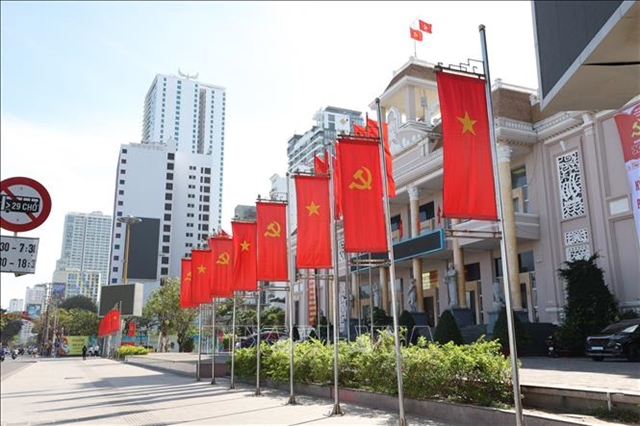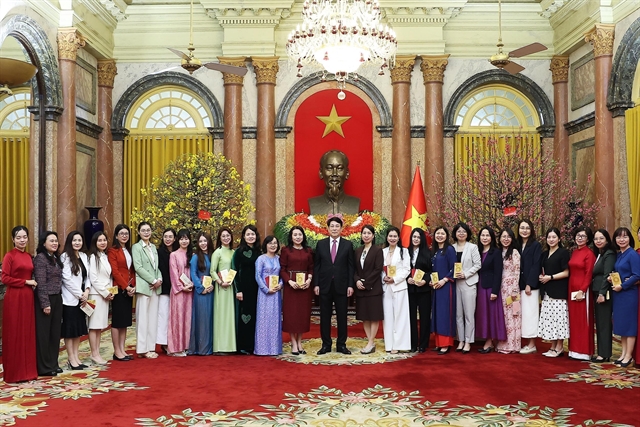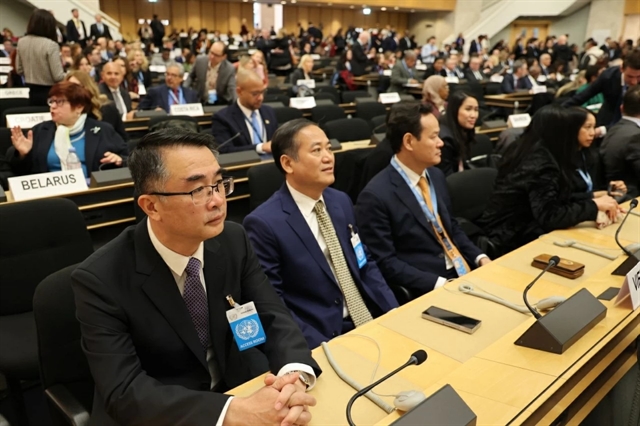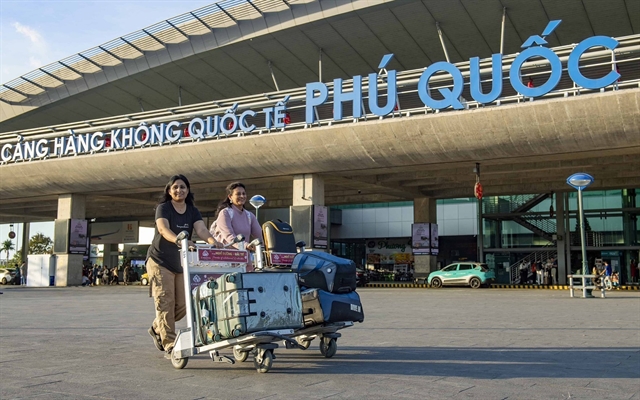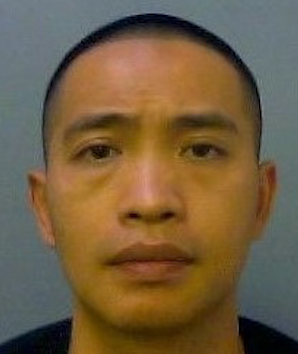 Society
Society

As the country battles to get a grip on the latest outbreak of COVID-19, Viet Nam News introduces a new weekly feature giving our readers a comprehensive review of the past seven days with round-up of stories related to the pandemic. Government officials, health workers and every single citizen all has a crucial role to play to keep the virus at bay.
As the country battles to get a grip on the latest outbreak of COVID-19, Viet Nam News introduces a new weekly feature giving our readers a comprehensive review of the past seven days with round-up of stories related to the pandemic. Government officials, health workers and every single citizen all have a crucial role to play to keep the virus at bay.
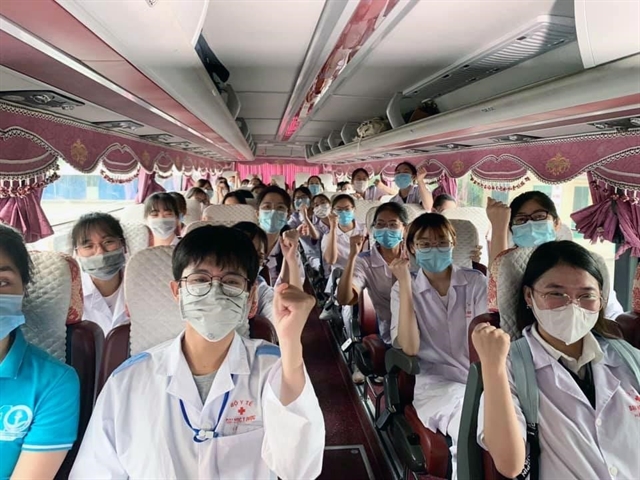
|
| Medical students from Hải Phòng City, along with healthcare staff from many other provinces, head to Bắc Giang Province to support local teams in the fight against COVID-19. VNA/VNS Photo |
It’s been just over a month since the fourth wave of the COVID-19 pandemic started in Việt Nam. The country’s facing its toughest time since the pandemic began, yet the Government is wasting no time adjusting to the new situation with swift, flexible and drastic measures.
In just 30 days, the total number of local COVID-19 cases reported was 3,294, more than the total cases reported in one year. The pandemic has spread to 31 provinces and cities, with the most cases detected in industrial parks. From April 27 until the morning of May 28, more than 2,300 workers in industrial parks have tested positive.
Bắc Giang Province is top of the list with 1,678 and Bắc Ninh Province second, with 676.
Experts say the more worrisome fact is the discovery of unknown sources of virus in five clusters: two in Hà Nội City, one in Điện Biên Province, and two in HCMC City. In the latest cluster linked to the members of the Revival Ekklesia Mission in HCM City, 37 people with the virus were reported in just 24 hours.
As early as the new pandemic cycle started, results of the genetic sequencing of specimens from imported cases into Việt Nam showed new SARS-CoV-2 variants: B.1.617.2 from immigrated Indian experts, B.1.222, and B.1.619.
The fact that viruses change rapidly and constantly create new variants that are super-contagious is a challenge in prevention, as we have to deal with the different characteristics of each strain.
Facing the situation head-on, the Government resorted to aggressive and unprecedented measures in an attempt to adapt to the new development of the pandemic and push it back.
Hundreds of doctors, nurses and other healthcare staff were quickly dispatched to the two hotspots, Bắc Giang and Bắc Ninh provinces, offering support. Fields hospitals and laboratories have been set up for on-spot testing and treatment.
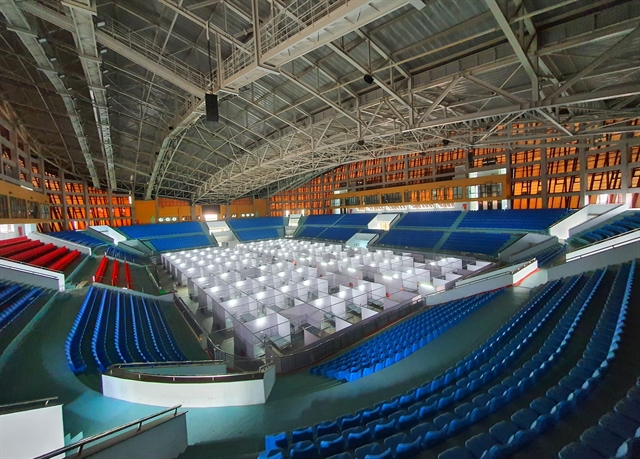
|
| A new field hospital was set up in Bắc Giang Province this week with a capacity of 620 beds. VNA/VNS Photo |
Large-scale testing was conducted in industrial parks and high-risk areas, healthcare staff work day and night to finish all the tests that need to be carried out. From April 17 to May 25, nearly 900,000 COVID-19 tests were performed.
While continuing with the measures that had brought the country success in the previous pandemic wave - a proactive containment strategy based on comprehensive testing, tracing, and quarantining, Việt Nam scaled it up when community transmission became complicated. Hundreds of thousands of people were placed in quarantine centres in an attempt to reduce both household and community transmissions. Hot spots with high rates of local infections were locked down immediately, again.
At the same time, the Government remained consistent in taking appropriate measures to have enough vaccines as soon as possible to vaccinate the people on a large scale. Given the tense situation at industrial parks, Prime Minister Pham Minh Chính ordered that frontline forces and workers in industrial parks would jump to the head of the vaccination queues.
He assigned the Ministry of Health to buy vaccines from various sources available as soon as possible and as many as possible; to adopt incentive policies to mobilise scientific and technological forces, businesses, and investors to research and produce vaccines locally; and to actively seek and receive technology transfer for domestic vaccine production.
The Government also issued a resolution on purchasing vaccines and asked the Ministry of Health to coordinate with the Ministry of Finance to establish a COVID-19 vaccine fund to call for contributions from agencies, units, localities, businesses, benefactors and donors.
Yesterday morning, the first workers in Bắc Giang and Bắc Ninh were given the first inoculations. Around 240,000 workers in foreign-invested companies in the two provinces will get vaccines in the next one to two weeks.
The total number of vaccinated people in the country is now more than a million.
Given the complexity of the situation, Deputy Prime Minister Vũ Đức Đam, chair of the National Steering Committee on COVID-19 Prevention and Control, even asked Bắc Giang Province to collect samples for screening testing at places that have yet to detect any infections or districts that have yet to apply social distancing, raising the prevention measures to a higher level.
As the number of direct contacts of positive cases amounts to dozens of thousands in two provinces Bắc Giang and Bắc Ninh, the Deputy Prime Minister has agreed to consider more flexible measures in the complicated situation: home quarantine to people having direct contact with confirmed coronavirus cases (F1), instead of putting them under centralised quarantine.
Initiatives
The new situation, new conditions, and new requirements on pandemic prevention and control make it necessary for Việt Nam to review, amend, supplement and complete processes, procedures and guidelines.
The quick response by the Government is also consolidated by the fact that a number of key decisions were made at the local level.
When the first cases were found in Đà Nẵng City in this pandemic cycle, the city’s authorities shut down affected areas, conducted quick mass testing, requested the Prime Minister to stop receiving repatriation flights to the city, suspended entertainment venues and cultural and sporting activities. Yesterday the city authorities said they plan to provide local bus and taxi drivers around 1,400 COVID-19 vaccine doses to reboot public transportation.
In another move, Deputy Prime Minister Vũ Đức Đam agreed with the proposal of Bắc Ninh Province’s leaders to rearrange the production of enterprises in Bắc Ninh’s industrial zones. The province will temporarily allow a number of workers to stay at factories, and at the same time arrange accommodation outside factories for workers who have to work in shifts, and transport them to the factories safely.
With such drastic, sound, and smart response, it shows the possibility that the situation will be governed well and, Việt Nam will once again gain success in this fight. — VNS

|

